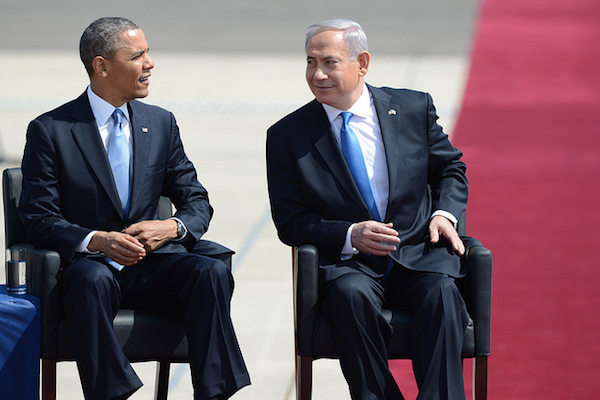Twenty three men and three women tell the captivating story of Netanyahu’s rise to power, and how he ended up on a collision course with the leader of the free world. Yes, 23 men and three women.

“Netanyahu at War,” a PBS Frontline documentary about Benjamin Netanyahu’s rise to power and the background to his now-infamous, ongoing feud with Barack Obama, opens with the controversy surrounding the Israeli prime minister’s address to Congress last March, which one of his former advisors frames as a Churchillian attempt to warn the world about the dangers of a nuclear deal with Iran. “Netanyahu,” says former advisor Eyal Arad, “has a messianic notion of himself as someone called to save the Jewish people.”
Over the next five minutes, we hear insights into the hostile Obama-Netanyahu relationship from no less than 10 name-brand experts (besides Eyal Arad): Ari Shavit, David Axelrod, Haaretz correspondent Chemi Shalev, Ronen Bergman, Sandy Berger, David Baker, Aaron David Miller, veteran Likud parliamentarian Tzachi Hanegbi, the New York Times‘ White House correspondent Peter Baker, and Dennis Ross. Axelrod describes Netanyahu’s meddling in U.S. foreign policy as “audacious” and “unprecedented.” Sandy Berger says it was a “direct attack” on Obama’s foreign policy legacy. Shalev observes that Netanyahu was “ready to undermine Israel’s relations with the U.S. in order to fight off the Iranian challenge.”
Having thus set the stage, over the next third of the documentary we learn about Netanyahu’s background. His illustrious combat career as an officer in the elite Sayeret Matkal commando unit, and his involvement in the mission to release the hostages during the 1972 Sabena Airline hijacking. The years he spent in the United States, first in high school, and then as an Israeli diplomat when he built his strong relations with leaders in the Jewish community. Then on to his return to Israel in the late 1980s and his rise to leadership in the Likud party during the Oslo period, leading up to Rabin’s assassination in 1995.
Twenty three men
At this point we’re 45 minutes into this documentary and we finally hear from an actual female expert. Really. Dana Weiss, an Israeli TV news presenter, explains why Israelis were insulted that Obama didn’t “stop by for coffee” after he gave his 2009 Cairo speech. And then Diana Buttu, the prominent Canadian-Palestinian attorney who was a spokesperson for the PLO and a participant in negotiations with the Israelis, speaks. But all we hear from her is a four-second clip about the Second Intifada, in which she explains that the Palestinians were “fed up” with the stalled negotiations and broken promises. But the narrator of the program had just presented the Second Intifada as a renewal of Palestinian violence.
We hear from Buttu a couple more times. Channel 2 reporter Dana Weiss gets a few more seconds. As does Tzipi Livni, the veteran Israeli politician, former foreign minister and former leader of the Kadima party. Leah Rabin, the late widow of Yitzhak Rabin, appears briefly in archival footage of a television interview she gave to an American network after her husband’s assassination.
And that is about it for the women in this long, detailed documentary.
But in addition to the 10 men who spoke in the first five minutes, we also hear from Saeb Erakat, Ben Rhodes (Obama’s deputy national security advisor), Marvin Kalb, Dore Gold, Peter Beinart, George Mitchell, Michael Oren, Jeffrey Goldberg, Martin Indyk, Dan Meridor (Likud politician) and journalist Dan Ephron.
Twenty three men and three women, with the women given a total of maybe four minutes collectively (and I am being generous) in a nearly two-hour episode.
We hear nothing from Madeleine Albright, Condoleeza Rice, Susan Rice, Ilana Dayan, Yonit Levi, Mazal Mualem, Lara Friedman, Tamara Coffman-Wittes, Hanan Ashrawi, Lucy Kurtzer Ellenbogen, Hillary Clinton or any other important, leading female analyst, journalist or politician who is truly an expert with real insights to bring. Oh, you’ve never heard of most them? That’s probably true. Because even thought they are leading experts in their fields, and despite the fact that many of them actually served in the State Department and were directly involved in negotiations with Israel and the Palestinian Authority, why bother to solicit fresh voices? Why, indeed, when the old boy’s club is so ready, willing and able.
Obama the Naive
But it’s not just the unapologetically and shamefully patriarchal attitude that undermines the credibility of this elegantly produced Frontline episode on Benjamin Netanyahu. It’s also the dubious political analysis that is left unchallenged.
Obama’s support for the Egyptian uprising, for example, is presented as childlike and naive. It is implied that the U.S. president’s enthusiasm for the popular uprising put Israeli security at risk. Jeffrey Goldberg suggests that Netanyahu was prescient in criticizing Obama for calling upon Mubarak to resign in February 2011. Netanyahu knew that “Muslim extremists” would take over, says Goldberg. This view is supported by Michael Oren, Israel’s former ambassador to the United States, and by Dan Meridor, the Likud politician.
There are no analysts to challenge this extremely shallow analysis of the rise of the Muslim Brotherhood in Egypt. No one mentions that under Morsi, the deposed president who came up through the Brotherhood, relations between Israel and Egypt remained as they had been under Mubarak. In fact, in 2012 Morsi came under fire from Egyptians — including secular opponents to the Brotherhood — for sending an effusively warm official letter to his “great and good friend,” then-president Shimon Peres. Cooperation between the Egyptian army and the Israeli army continued uninterrupted under Morsi. Nor does anyone bother mentioning the potential damage to the United States’ credibility in the Arab Middle East if Obama had offered to continue supporting a deeply unpopular authoritarian leader while millions demonstrated against him on the streets.
This theme of naive Obama and Obama the Arab lover dominates “Netanyahu at War.” Obama is criticized heavily for calling for a settlement freeze right after he gave his 2009 speech at Cairo University and immediately after Netanyahu was elected. None of the analysts denies that it had always been U.S. policy to oppose Israel’s settlements in the occupied territories. But Indyk, Ross and Mitchell all agree that in hindsight it was bad timing to reiterate U.S. policy after, oh, only 42 years of unceasing settlement expansion. Obama should have waited.
Goldberg and Oren both criticize Obama for “putting daylight” between Israel and the United States in order to make nice with the Arabs. Ben Rhodes, Obama’s deputy national security advisor, is given a few seconds to point out that not only has opposition to settlements been the policy of every U.S. administration, but that in his seven years of experience he has learned that you’re “damned if you do and damned if you don’t” in every decision regarding Middle East policy.
I take serious issue with the overall tone of the analysis offered by the various participants interviewed for this program, with a few notable exceptions. At the very least, there should have been some strong voices to counter the narrative that Obama was naive or that he deliberately undermined relations with Israel in order to pursue his alleged love affair with the Arab states. Both accusations are absurd and insulting.
And I must emphasize again that this male dominated discourse has to stop. It simply must. The year is 2016. Washington is full of senior, expert female policy analysts and journalists. There is no shortage of expert women in Israel or in Palestine, either. When they are left out of a current affairs documentary for an important program like Frontline, it constitutes a serious omission that undermines its credibility. Why in the world are men in their 60s who have not been involved in policy making for nearly two decades still considered experts while female diplomats who were directly involved in high level negotiations over very recent years completely ignored?
“Netanyahu at War” will be broadcast Tuesday night (tonight) on PBS in the United States. Viewers abroad can watch it online. It’s a well-edited documentary that flows and and offers some insights that will engage even those who know the story intimately. But it is also deeply flawed in its framing and seriously undermined by its failure to include both genders — and, also, by its having omitted Palestinians. Saeb Erakat and Diana Buttu aside, what we have here is a program dominated by American Jewish men who live in Washington or New York. Again.

